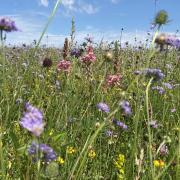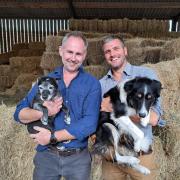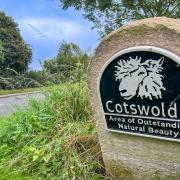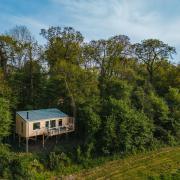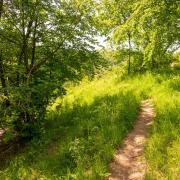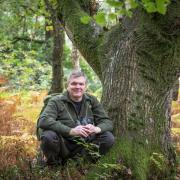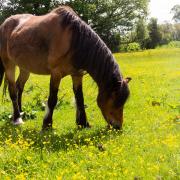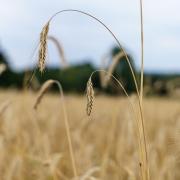Almost £1 million in grant funding is already helping exciting new projects across the Cotswolds, and there is over £1 million more still available. Words by Siân Ellis. Photography by Russell Sach
In this column last August we reported on the launch of the three-year Farming in Protected Landscapes programme, part of Defra’s Agricultural Transition Plan to re-set the future of the country’s farming. Running until March 2024, the programme aims to help farmers, land managers and others to deliver work on farmed land under themes of climate, nature, people and place – in ways that are right for the Cotswolds National Landscape.
The Cotswolds National Landscape team, which is handling the programme locally, has already allocated almost £1 million in grant funding since the programme launched in July 2021, supporting 39 projects whose value in total is £1,674,200.

Commenting on the diversity of successful project applications, Scott Brown, Farming Engagement Lead for Cotswolds National Landscape says, ‘there’s a clear willingness to adapt and seize opportunities that will lead to a more prosperous future, not only for farmers, but for people, wildlife and the planet.’
Just over £1 million is still available to fund suitable projects and anyone interested is urged to apply sooner rather than later (see end of feature). In the meantime, here are highlights from just a few inspirational projects.

Getting fruity: orchard restoration and training
Gloucestershire Orchard Trust (GOT) has received a grant of circa £42,500 towards a three-year project to provide training to young people, community orchard volunteers, farmers and others interested in a career or gaining knowledge to preserve traditional orchards in and around the Cotswolds.
According to GOT, some 75% of the county’s orchards have been lost in the past 50 years due to changes in agriculture and the way in which supermarkets source their fruit. The charity works to slow down and reverse the decline, and to raise awareness of Gloucestershire’s fruit-growing heritage, including around 67 apple varieties unique to the county and around 142 regionally unique varieties of perry pears (from Gloucestershire, Herefordshire, Worcestershire and Monmouthshire).

Orchardist and GOT co-chairman Martin Hayes, who is leading workshops supported by the grant, waxes lyrical over the habitat value of traditional orchards that host a diversity of insects, pollinators and birds. ‘All these things are symbiotic. Traditional orchards are generally unsprayed and you have to think about what will work together, what to plant to encourage the right wildlife to come and help you out. For example, people think planting daffodils around a tree looks pretty – yes, but it also encourages ladybirds that are attracted to the colour yellow, and the ladybirds will eat aphids.’
Practical hands-on sessions are being held at (and will benefit) orchard sites. Training ranges from grafting and budding to planting and guarding, fruit tree maintenance, restorative pruning of mature trees, managing sward and hedgerows, and using the harvested fruit.
‘The whole idea of traditional orchards, and their survival, depends on people using the fruit, and we will be offering taster sessions – a good description – of things like making apple juice and cider.
‘All the training sessions are about getting people involved in orchards, giving them confidence by showing them simple skills and principles.’
Look out for sessions advertised on local community / social media, and GOT website glosorchards.org

Making connections: Eastleach Downs Organic Farm
‘There is such a disconnect between privileged people like us who have access to acres of land to walk on and people who don’t even have a garden. There’s also a lack of conversation and public understanding about farming. We really wanted to do something about that.’

Farmer Helen Wade is explaining why she and husband Sam decided to apply for a grant and create a path around their farm providing public access including to people with disabilities. They aim to launch it this autumn and hope under-represented groups, often deterred by difficult terrain or unsure of whether they ‘belong’ in the countryside, will be encouraged to visit and feel welcome.
Farmers for 30 years, the couple are tenants of the educational charity The Ernest Cook Trust at Eastleach Downs Organic Farm. Their pedigree British Saddleback pigs are free range and as far as possible are sustainably fed with ration grown on the farm. There is also an on-farm butchery.
The Disabled Ramblers and Cotswold Voluntary Wardens as well as The Ernest Cook Trust have already been helping with the new public access project. A grant of £42,000 will enable the creation of a three-metre-wide path, planted with hard-wearing grass, running around the perimeter of the farm in two x two-mile stretches. The grant is also being used to lay tracks to a car park, and to construct a welfare and information hub with disabled access. Signage is to be funded by The Ernest Cook Trust.

‘Path users will be able to see how we rotate our pigs and crops around the farm,’ Helen says. ‘We also have wildflower meadows that visitors will be able to see. We strive to farm with nature and we really care about our animal welfare, and we hope that by opening the path around the farm we can educate people about how it all works.’
The new path is hoped to launch this autumn, eastleachdowns.co.uk
The North East Cotswold Farmer Cluster CIC
Applications for funding can be made by people who get together as a group, as well as by individuals and single organisations. The North East Cotswold Farmer Cluster CIC (NECFC) successfully bid for £176,605 across four projects.
Based around the Evenlode and Windrush catchments and already busy working together before grants became available, the dynamic cluster of farmers and landowners has grown astonishingly fast from 22 farms covering circa 8,000 hectares in January 2021 to around 100 farms covering more than 33,000 hectares today.

Through collaboration and knowledge exchange, ‘the group is collectively adopting regenerative farming practices, integrated into food production, to restore and enhance the environment around them,’ says NECFC facilitator and co-chair Tim Field. ‘Ultimately, the whole is so much greater than the sum of the parts, and that is key to a farmer group like us.’
The cluster’s funded projects (there’s only room for the briefest of highlights here!) include supporting Tim’s post as facilitator (until applications for government funding re-open in summer). There’s also a project using blended finance to test some of the principles of landscape recovery such as water quality improvement and habitat creation on five farms.
In partnership with world-leading Rothamsted Research Institute, a third, pioneering carbon project involving 36 farms will measure baseline soil carbon. Uplift through different sustainable farming practices can then be accurately modelled and, if farmers choose to, ‘it can be traded so that the farmer gets payment for capturing carbon out of the atmosphere and putting it in the soil.’

A fourth project, involving 29 farms, focuses on the supplementary feeding of winter bird food cost-effectively produced using seed from the cluster’s farms – 26 tonnes was distributed this winter. Post-doctoral students from Oxford University’s Zoology Department are carrying out winter farm bird surveys to monitor results over three years, providing a benchmark for future years.
Find out more about the cluster’s landscape-scale projects and ambitions at cotswoldfarmers.org
For more information or to apply for Farming in Protected Landscapes funding, email Scott Brown at farming@cotswoldsaonb.org.uk




